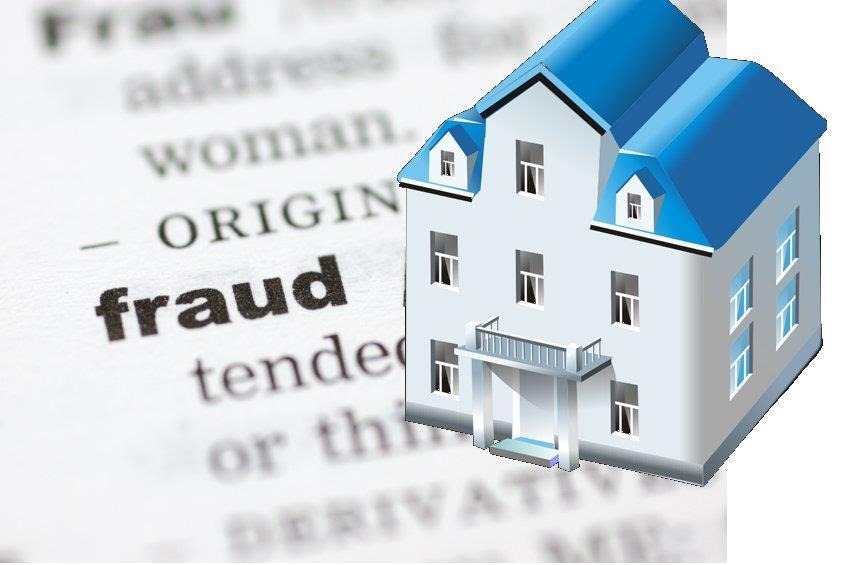Navigating the complexities of the Indian real estate market can be daunting, especially with the risk of fraud looming over property transactions. From fraudulent documentation to investment scams, real estate fraud takes many forms, targeting both residential and commercial buyers. Housiey presents this in-depth guide to help you identify, understand, and prevent these frauds, ensuring that your journey toward homeownership or investment remains smooth and secure.
What Are the Most Common Real Estate Scams?
Real estate scams come in various forms, often exploiting loopholes in the system or leveraging the buyer’s lack of experience. Here’s a closer look at some major scams:
Title Fraud or Land Registry Frauds in India
- What is Title Fraud?
Title fraud occurs when a fraudster falsifies property ownership records and illegally transfers or sells a property without the owner’s knowledge. In India, land registry fraud is a growing concern, especially for non-resident property owners. - Example: Fraudsters impersonate an NRI owner, forge documents, and sell the property to an unsuspecting buyer. The original owner may only discover the fraud when they try to sell or use the property.
- Impact: Victims lose ownership and often face lengthy legal battles to recover their property. This fraud is particularly common with unoccupied or inherited properties.
How to Avoid It?
- Conduct Regular Checks: Verify ownership details with the sub-registrar’s office at regular intervals.
- Link Aadhaar and PAN: Attach your property details with these documents to prevent tampering.
- Hire Legal Experts: A real estate fraud attorney can perform title searches and identify potential issues.
- Monitor Land Records Online: Use state-level portals to keep track of any unauthorized changes.
Also Read:- Pros and Cons of Buying a Property Near Mumbai Metro Lines
How Do Home Buying Scams Target First-Time Buyers?
- What Are Home Buying Scams?
These scams target inexperienced buyers with promises of low rates, guaranteed returns, or exclusive deals, often involving unapproved or fictitious projects. - Example: A scammer advertises an under-construction project offering ‘pre-launch discounts’ but disappears after collecting booking amounts.
- Impact: Buyers lose both their money and the chance of acquiring a home, often with little legal recourse.
How to Avoid It?
- Visit the Site: Never rely solely on brochures or virtual tours—visit the location personally.
- Check Builder Credentials: Research the builder’s track record and RERA registration status.
- Use Escrow Accounts: Make payments through escrow services to ensure the funds are only released upon project completion milestones.
- Demand Legal Documents: Ask for the project’s approval certificates and NOCs from local authorities.
Also Read:- Important 21 Questions to Ask When Buying A New House
What Types of Property Frauds Should Buyers Be Aware Of?
Property frauds typically involve forged documents, impersonation, or selling encumbered properties. These scams can lead to financial losses and long legal disputes.
Examples of Misrepresentation in Real Estate:
- A seller claims that a property is debt-free when there are ongoing loans or liens.
- A project is marketed with lavish amenities that are not delivered.
How to Avoid It?
- Verify Encumbrance Certificates: Ensure there are no pending loans or disputes on the property.
- Hire an Independent Appraiser: Validate the property’s value through third-party professionals.
- Cross-Check Property Listings: Be cautious if the same property is listed for sale by multiple parties.
What Are Real Estate Fraud Schemes Involving Loan Misrepresentation?
- What is Loan Misrepresentation?
In these fraud schemes, scammers forge property values or use stolen identities to secure housing loans. Builders may also collaborate with agents to inflate prices for higher loan eligibility. - Impact: The buyer may end up paying for a property that is overvalued, or worse, the loan defaults under the buyer’s name without their knowledge.
How to Avoid It?
- Verify Loan Sanction Letters: Ensure the documents are issued by reputable banks and not intermediaries.
- Avoid Third-Party Agents: Work directly with banks to get accurate loan offers.
- Monitor Credit History: Regularly check your credit score to spot unauthorized loans or inquiries.
What is the Statute of Frauds Real Estate Requirement, and Why Does it Matter?
The Statute of Frauds is a legal principle that mandates that real estate agreements be in writing to be enforceable. In India, verbal promises regarding property transactions hold no legal weight and can lead to disputes.
- Impact: A buyer may lose their deposit if the seller backs out of a verbal agreement, claiming that no formal contract exists.
How to Avoid It?
- Get Everything in Writing: Insist on written agreements for all transactions and commitments.
- Include Key Terms: Ensure the sale agreement outlines payment schedules, penalties, and project timelines.
- Notarize Documents: Authenticate agreements through a notary to strengthen their legal standing.
What Types of Commercial Real Estate Fraud Exist?
What Are Commercial Real Estate Scams?
These scams involve unauthorized developments, inflated returns, or fake lease agreements designed to lure businesses and investors.
- Example: Developers sell office spaces with promised long-term tenants, but the tenants do not exist, leaving the investor without returns.
How to Avoid It?
- Verify Lease Agreements: Confirm tenant details through independent verification.
- Conduct Market Research: Analyze rental trends in the area to identify over-inflated claims.
- Work with Legal Experts: A real estate fraud attorney can help scrutinize lease agreements and identify red flags.
How Can You Protect Yourself from Land Registry Frauds in India?
How Does Land Registry Fraud Occur?
Fraudsters forge ownership records or modify land registry details to sell a property illegally.
- How to Avoid It?
- Monitor Property Ownership Records: Regularly check the status of your property with the local sub-registrar.
- Digitize Property Records: Some states offer online portals to track ownership and prevent tampering.
- Appoint a Representative: For NRIs, appoint a legal representative to monitor property transactions.
What Are Red Flags of Real Estate Misrepresentation?
What is Misrepresentation in Real Estate?
Misrepresentation occurs when sellers provide false information about a property’s condition, legal status, or amenities.
- Red Flags to Watch For:
- Promised amenities are unavailable or differ significantly from the brochure.
- The builder offers “too-good-to-be-true” discounts to push a quick sale.
- How to Avoid It?
- Visit the Property in Person: Never trust brochures or virtual tours blindly.
- Get an Independent Inspection: Hire a property inspector to verify the condition and amenities.
How Do Real Estate Fraud Attorneys and Investigators Help?
- Role of Real Estate Fraud Attorney:
They provide legal counsel, draft contracts, and identify fraudulent practices before transactions are completed. - Role of Real Estate Fraud Investigator:
Investigators use forensic tools to detect discrepancies, fake documents, and undisclosed liabilities. - When to Hire Them?
- If you suspect forged documents or undisclosed encumbrances.
- In high-value transactions where the risk of fraud is high.
Conclusion: Safeguard Your Investments with Housiey
The journey toward purchasing property, whether residential or commercial, can be both exciting and overwhelming. However, the presence of real estate fraud schemes demands a cautious approach. From misrepresentation to land registry fraud, the risks in the Indian real estate market are substantial. Identifying red flags early on and employing professional help can make a significant difference. Ensuring proper documentation, cross-verifying information, and working with RERA-registered builders are some of the key steps to protect yourself from falling prey to scams.
At Housiey, we believe in empowering buyers with the right knowledge and resources. We aim to simplify the home-buying process by connecting you directly with reputed builders, thus eliminating middlemen and unnecessary brokerage fees. Our focus on transparency and authenticity ensures that your personal details are never circulated among brokers, keeping your journey smooth, hassle-free, and confidential.
Informed buyers make better decisions. Whether you’re purchasing your first home or investing in commercial real estate, staying alert is your best defense against fraud. Educate yourself, hire legal experts when necessary, and be diligent at every step. The real estate market is full of opportunities, and with the right knowledge and trusted platforms like Housiey by your side, your dream of owning property can become a safe and fulfilling reality.
FAQs
What is real estate fraud?
- Real estate fraud involves deceptive practices in property transactions, leading to financial loss or ownership disputes.
How common is real estate fraud in India?
- Real estate fraud is increasing, especially in high-demand areas, including metropolitan cities and tourist hotspots.
What are common real estate scams buyers face?
- Fake listings, title fraud, loan misrepresentation, and unapproved pre-launch sales are prevalent scams.
How do title frauds happen?
- Fraudsters forge ownership documents to transfer or sell properties illegally, often without the owner’s knowledge.
What is the statute of frauds in real estate?
- It mandates that real estate contracts, including property sales, must be in writing to be enforceable.
Can a property be sold without the owner’s consent?
- Yes, through forged documents, but buyers can avoid this by verifying ownership with the land registry office.
What are examples of misrepresentation in real estate?
- Sellers providing false information about property condition, amenities, or legal status are common examples.
How do home buying scams work?
- Scammers lure buyers with fake projects or discounts, often collecting booking amounts and disappearing.
What are the signs of a real estate scam?
- Unrealistic discounts, lack of legal documentation, and pressure to close the deal quickly are major red flags.
What types of property frauds are common in India?
- Land registry fraud, encumbrance fraud, fake builder projects, and tenancy scams are widespread.
How can commercial real estate fraud affect investors?
- Investors may lose money on fake projects or inflated rental promises, resulting in no returns or vacant spaces.
How does loan misrepresentation impact buyers?
- Buyers may unknowingly take on loans for overpriced properties or become victims of identity theft.
What steps can buyers take to prevent fraud?
- Conduct title searches, hire lawyers, cross-verify builder credentials, and use escrow accounts for payments.
What is the role of a real estate fraud attorney?
- A real estate attorney ensures all legal documents are in place and identifies potential red flags in contracts.
How does a real estate fraud investigator help?
- Investigators detect fraudulent activities through document verification, forensic audits, and ownership checks.
How can NRIs protect their properties in India from fraud?
- NRIs should appoint legal representatives, monitor land records, and link their property with Aadhaar and PAN.
What is land registry fraud, and how can it be prevented?
- Fraudsters alter ownership records to sell properties illegally; regular record checks and document digitization help prevent this.
What should I do if I suspect property fraud?
- Immediately consult a lawyer or fraud investigator, and report the issue to local authorities and land registries.
What are escrow services, and how do they prevent fraud?
- Escrow accounts hold funds until all contract terms are met, ensuring safe and transparent transactions.
How can Housiey help me avoid real estate scams?
- Housiey connects you directly with reputed builders, ensuring transparency and eliminating intermediaries, keeping your investment secure.







